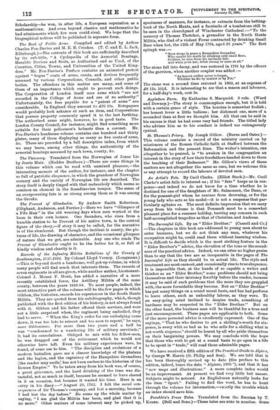Records of the Infantry Militia Battalions of the County of
Southampton, 1757-1894. By Colonel Lloyd Verney. (Longmans.) —This is beyond doubt a handsome, well got-up volume, in which many people will find much that interests them. The records of seven regiments in all are given, while another author, Lieutenant- Colonel J. Mouat F. Hunt, has added a narrative of a more recently established force, the Artillery Militia of the same county, between the years 1853-94. To most people, indeed, the most attractive part of tho volume will be the few pages in which Gibbon, the historian, records his experiences in the South Hants Militia. They are quoted from his autobiography, which, though published with the first edition of his history, is not always found with it. Gibbon and his father offered their services, and were not a little surprised when, the regiment being embodied, they had to serve. " When the King's order for our embodying came down, it was too late to retreat and too soon to repent," he says, more Gibboniano. For more than two years and a half he was "condemned to a wandering life of military servitude," It had its consolations. Obliged to mix with his fellow-men, ho was dragged out of the retirement which he would not otherwise have left. Even his military experiences were, be found, of some use to him. " The discipline and evolutions of a modern battalion gave me a clearer knowledge of the phalanx and the legion, and the captaincy of the Hampshire Grenadiers [the reader may smile] has not teen useless to the historian of the Roman Empire." To be taken away from his book was, of course, a great grievance, and the hard drinking of the time was dis- tasteful, not so much in itself, because he seemed to have shared in it on occasion, but because it wasted his time. Here is an entry in his diary :—" August 29, 1762. I felt the usual con- sequences of Sir Thomas's company, and lest a morning, because I had lost the day before." He sums up the whole matter by saying, " I am glad the Militia has been, and glad that it is no more." Other matters of some interest may be picked up,
specimens of manners, for instance, or extracts from the betting- book of the North Hants, and a facsimile of a tombstone still to be seen in the churchyard of Winchester Cathedral :—" To the memory of Thomas Thatcher, a grenadier in the North Hants Militia, who died of a violent Fever contracted by drinking Small Beer when hot, the 12th of May 1764, aged 28 years." The first epitaph was :—
Here sleeps in peace a Hampshire Grenadier
Who caught his death by drinking cold small Beer. Soldiers, be wise from his untimely fall:
And when ye're hot, drink strong or none at all."
The stone fell into decay, and was restored in 1781 by the officers of the garrison, when another couplet was added : —
"An honest soldier never is forgot,
Whether he die by musket or by Pot."
The stone was a second time restored in 1802, at an expense of .28 12s. 100. It is interesting to see that a mason and labourer, for a half-day's work, cost 3s.


















































 Previous page
Previous page